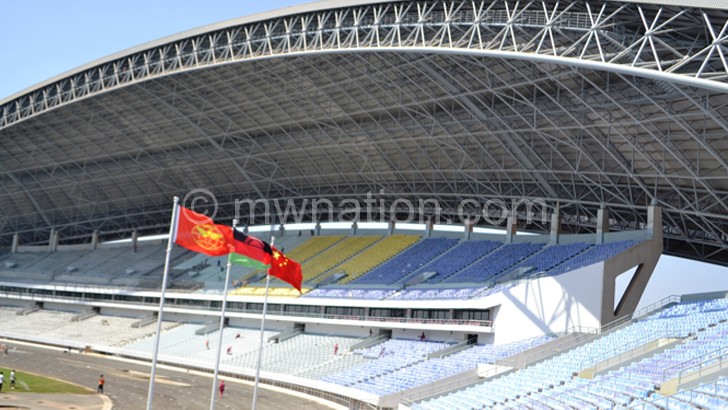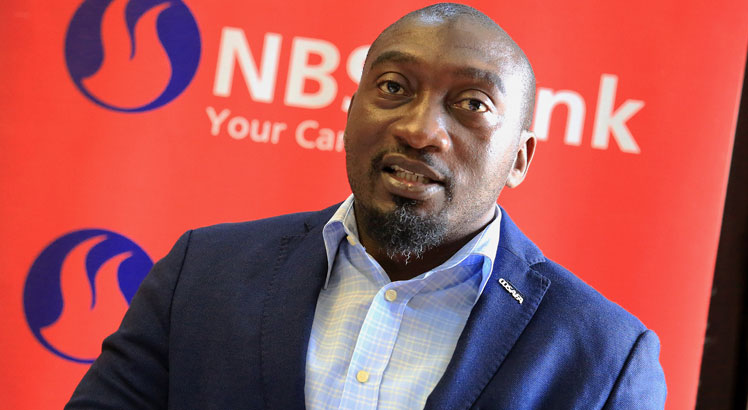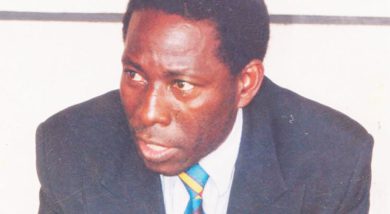No plans to outsource Bingu Stadium
Despite some stakeholders putting pressure on government to outsource the newly constructed Bingu National Stadium, government has said the Ministry of Sports and Culture will manage the facility.
Director of sports Jameson Ndalama said managing a stadium was not a lucrative business; hence, the decision not to outsource.
“The government is not a profit-making organisation. It is a service provider,” Ndalama said. “So, even if it doesn’t make profit from the stadium, government will still maintain it, unlike if it were a private-owned facility.”

The Ministry of Sports has already spent K5 billion out of its K5.9 billion budget allocation for this year on furnishing the facility, resulting in Kamuzu Stadium, which is in dilapidated state and needs about K150 million for rehabilitation, to be left in the cold.
Ndalama said the ministry was ready for the challenge of maintaining the new stadium despite its other properties—Kamuzu Stadium and BAT Ground—being almost in ruins.
“The ministry is capable of maintaining the new stadium. We cannot give a projection of how much it would cost to maintain it, but a management team is already in place and will work with building department to come up with the exact cost.”
“We also sent a team to China and Zambia where the officials were trained on how to manage such a structure. They were taught general management and maintenance of the facility and several skills regarding running it. Right now the team is already in place and coming up with management guidelines.”
On the government’s failure to maintain Kamuzu Stadium and fears that the Bingu National Stadium would be a white elephant, Ndalama said:
“There is a misconception that the government is failing to maintain Kamuzu Stadium. Though we might not completely deny this, the problem with Kamuzu Stadium is that it is too old and difficult to manage. There are no security structures at the facility. The wall is not high enough and as a result it suffers from massive vandalism. The rate of vandalism is higher than that of maintenance. Today, we fix the toilet taps, tomorrow someone steals them. That’s the main problem with Kamuzu Stadium,” he said.
“The new stadium on the other hand, is very secure. There is no chance that someone can jump over the fence and vandalise the facility. Kamuzu Stadium has several entrances and this makes it difficult to control people. The new stadium, has two main entrances. The other entrance leads straight to the VIP. The new stadium also has closed circuit television (CCTV) which makes monitoring easy.”
However, sports management expert from Mzuzu University, Alfred Gunda, has warned that the Bingu National Stadium may easily slide into a white elephant if government sticks to its guns let Sports Ministry manage it.
“The government has done its part by bringing us that facility. That’s an investment and at some point, we will have to pay back the loan to China. Let’s not overburden government with managing and maintaining of the stadium,” Gunda said.
“Look at how South Africa government has been overburdened by maintenance of the 2010 World Cup stadiums. The stadiums have become a white elephant because even a bigger economy like that of South Africa is failing to maintain them.”
Gunda also disputed Ndalama’s stance that stadium management is not a profitable business venture.
“People need to think outside the box. Elsewhere stadium ownership is a private business. It’s not the government that owns stadiums. Banks and other companies are into stadium ownership because its big business,” Gunda said.
“There are several ways of making revenue apart from the games that can be played there. That is why you need a serious firm to run the facility because it will make sure revenue is generated from the facility.”
Meanwhile, Super League of Malawi (Sulom) has called for a stakeholders’ meeting to discuss the issue.
“There is need for government and other stakeholders such as Sulom and Football Association of Malawi to brainstorm on the way forward,” Sulom general secretary Williams Banda said.
“Government has a sports policy and we are the implementers of that document. Through contact and dialogue, I think we can come up with one decision that will make sure that facility is managed and maintained well.”
The 40 500 capacity stadium built using a K29.4 billion concessional loan payable in 20 years, will be handed over to Sports Ministry on November 30.
The national stadium has facilities such as a synthetic running track, natural grass football pitch, shopping and exhibition rooms, press galleries, treatment room, bathrooms and a car park. The facility will also have fire fighting technology.






Ndalama you have made a very important point that the stadium is not a lucrative business. You do not have to build a stadium because of profits. It is for social purposes. Gunda is thinking like a typical capitalist. We do not want this type of mentality whereby everything is look at with a profit motive.
Can Gunda tell Malawians which country in Africa is making profits out of stadiums? Also outsourcing a stadium does not make sense. It is people with Gunda’s mentality that is making Malawi POOR because you don’t believe in yourself. You want everything to be done for you by others. Why outsource it? Thanks very much Ndalama by showing people like Gunda that you have the capacity to run the stadium. 51 years of independence and you want people to be running structures for you.
Gunda is also not saying the truth that the stadiums in South Africa have become a white elephant. What do you mean by white elephant?The stadiums are being used by PSL teams. The FNB, for example, is always full when Chiefs and Pirates are playing . DO NOT LIE. These stadiums are used every week by PSL teams.
Our stadium will be making money. It will not only be used by soccer teams, but other organisations as well.